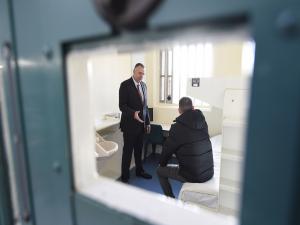
By David Young
Prison authorities should consider tagging life sentence prisoners on unescorted temporary release, a watchdog has said.
The recommendation from Criminal Justice Inspection NI (CJI NI) comes after a number of high-profile incidents that raised concerns about how pre-release testing is undertaken.
A number of prisoners who have served lengthy terms are required to participate in the testing, which can involve short unescorted leave periods, ahead of their final release into the community.
Concerns were raised in late 2018 after several convicted murderers were photographed hiking in the Mourne mountains, under supervision, as part of their testing.
Around the same time, a life sentence prisoner absconded while on day release.
CJI NI noted that electronic monitoring had been used for prisoners released on licence or people on bail since 2010, but not for PRT prisoners.
The inspection report said: "Several NIPS (Northern Ireland Prison Service) managers suggested it would provide a useful additional control, particularly if Global Positioning System (GPS) technology was applied."
Inspectors noted that a law change could be required to facilitate a trial - a move they acknowledged could be difficult given the current lack of powersharing government.
"While the current legislative framework for electronic monitoring in Northern Ireland may constrain a trial, particularly in the current political circumstances, the NIPS should advocate for all opportunities to strengthen their PRT arrangements," said the report.
Inspectors recommended: "The NIPS should explore the feasibility of using electronic monitoring on a trial basis to support PRT and other forms of temporary release from prisons."
Commenting on the publication of the report on pre-release testing, Brendan McGuigan, Chief Inspector of Criminal Justice in Northern Ireland, said processes and procedures were "generally functioning well".

IMAGE: Brendan McGuigan, Chief Inspector of Criminal Justice in Northern Ireland
"This review looked the criteria applied and parameters in place within the NIPS under which prisoners could participate in all forms of accompanied and unaccompanied temporary release from prison under the NIPS pre-release testing process," he said.
"Previous CJI prison inspection reports had found the NIPS pre-release testing process to have been working well. We have acknowledged in this review that temporary release from prison provides important information to aid decision making around managing risk, assessing the suitability of a prisoner for release back into the community, and maintaining public safety.
"During this review, inspectors found the processes and procedures in place within the NIPS around pre-release testing were generally functioning well, but they identified areas in which improvements could and should be made, particularly in relation to the use and operation of the NIPS' external activity schemes.
"Inspectors were concerned that these schemes - which aimed to incentivise long-term prisoners and promote their physical and mental well-being - did not have any explicit or consistent rationale and their operation depended upon the discretion of the various prison governors.
"While to date the use of discretion had not been proven wrong and the schemes' staff-to-prisoner ratio numbers were high, inspectors identified that a small number of prisoners, who were ineligible for temporary release from prison due to the length of the sentence, had participated in these external activity schemes."
The chief inspector also flagged the importance of notifying victims registered with the Prisoner Release Victim Information Scheme (PRVIS) when individual prisoners are given approval to participate in external activity schemes.
Mr McGuigan also urged all victims to register with the PRVIS so that they could be informed of decisions made in relation to prisoners and their release, as there was no automatic entitlement to this information without being registered.
Director-general of NI Prison Service Ronnie Armour had asked Mr McGuigan to review pre-release testing practices.
Mr Armour welcomed the report, which he described as "very positive".
"The report indicates that human rights standards require the prison service to ensure prisoners' rehabilitation and reintegration into society and I am pleased that this report demonstrates that we are doing that and that we are doing it well," he said.
"Pre-release testing is a vital component in underpinning public safety, but it is challenging and requires careful risk management. People will fail our testing process but that is not evidence of the process failing, it is evidence that the robust arrangements we put in place work. Failure is an important part of pre-release testing.
"For example, the inspector found that of 36 life sentence prisoners released from Burren House - our pre-release unit, in 2018 - two had to be recalled. By way of contrast, 12 of the 20 lifers who did not go through Burren were recalled in the same period; clearly demonstrating how effective pre-release testing is.
"In Northern Ireland, there is no 'life means life', meaning the alternative is to release people straight back into the community without testing.
"Whether we are talking about compassionate temporary release, accompanied temporary release or unaccompanied temporary release, this report gives the public confidence that we take our responsibilities seriously and have robust risk assessment processes in place that underpin all we do."


 Calls for State apology for Stardust families after unlawful killing verdicts
Calls for State apology for Stardust families after unlawful killing verdicts
 Lecturers to end industrial action after accepting pay offer
Lecturers to end industrial action after accepting pay offer
 Range of views on proposed smoking ban – Little-Pengelly
Range of views on proposed smoking ban – Little-Pengelly
 Opera director to use £5,000 award for projects to help vulnerable and homeless
Opera director to use £5,000 award for projects to help vulnerable and homeless
 Ministers pledge to work together on baby loss certificate scheme
Ministers pledge to work together on baby loss certificate scheme